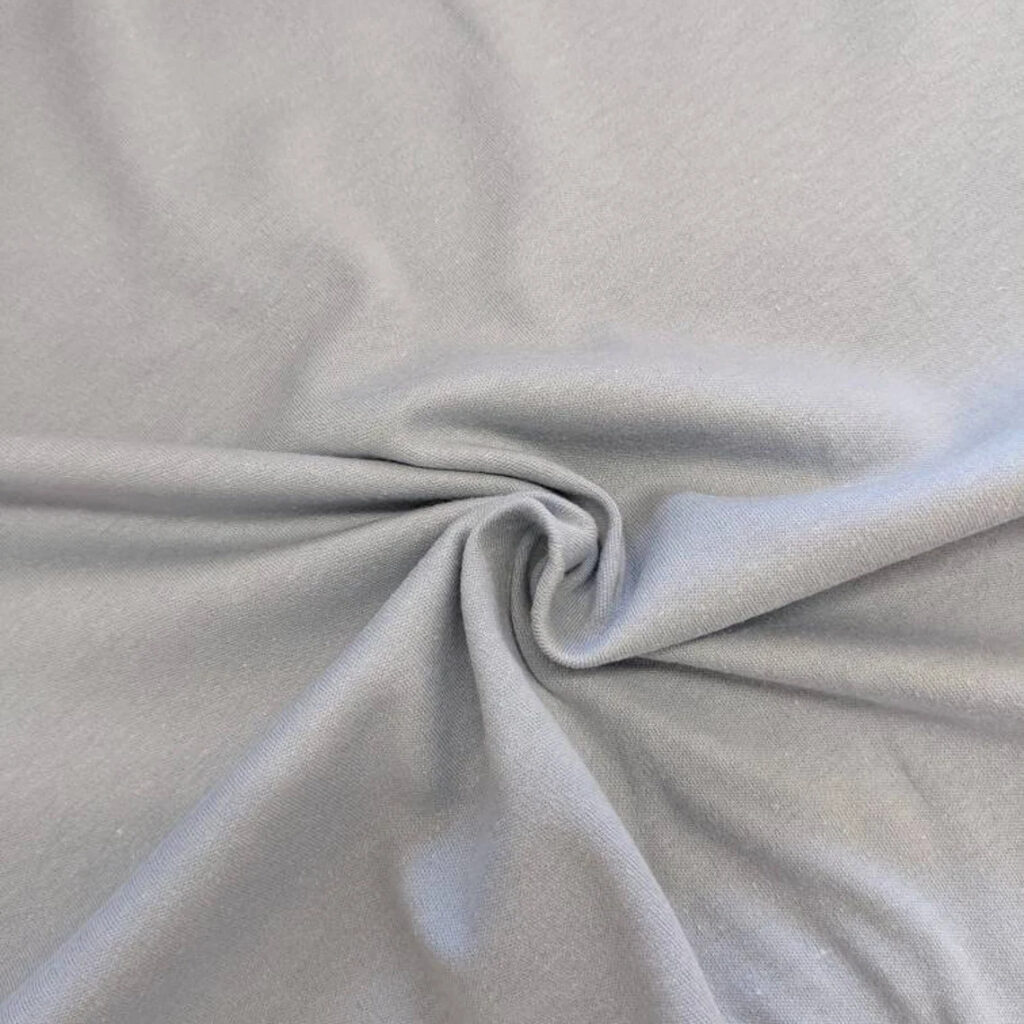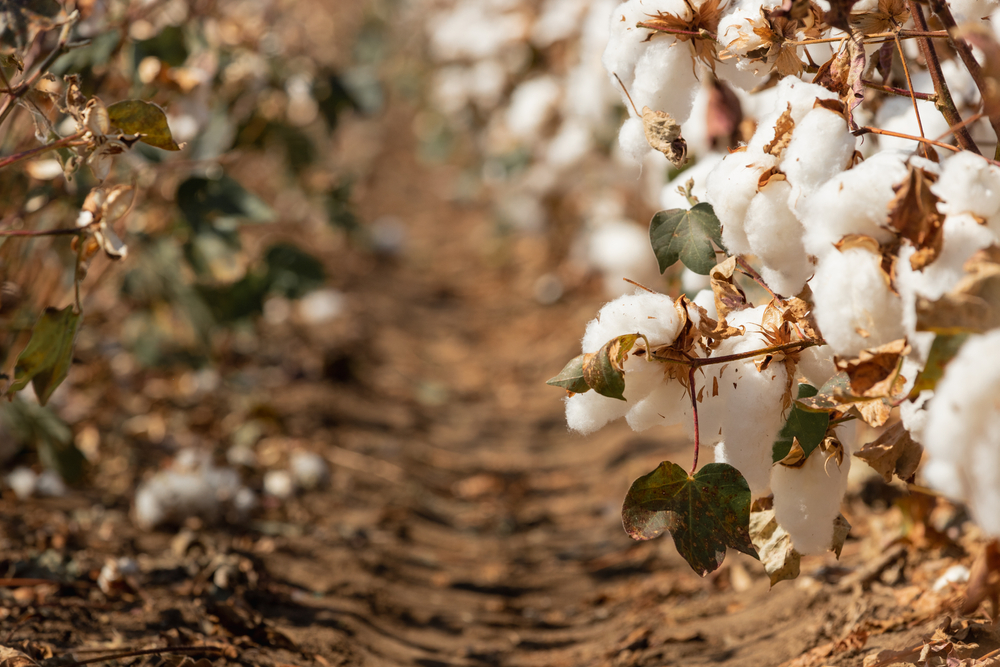Organic cotton fabric is celebrated for its eco-friendly attributes and superior softness, making it a top choice for sustainable women’s fashion.
At Jinfeng Apparel, we are committed to using organic cotton in our garments to provide stylish, comfortable, and environmentally responsible options for modern, eco-conscious consumers.
In this blog, we will explore the unique qualities of organic cotton, its production process, and its importance in creating sustainable fashion.

What is Organic Cotton Fabric?
Organic cotton fabric is a natural textile produced from cotton plants grown without synthetic pesticides, fertilizers, or genetically modified organisms (GMOs).
It emphasizes environmentally friendly farming practices that protect ecosystems and support better working conditions for farmers. Known for its softness and breathability, organic cotton is an ideal choice for sustainable women’s fashion at Jinfeng Apparel.
Origin and Source of Organic Cotton Fibers
Organic cotton is predominantly grown in countries like India, Turkey, China, and the U.S., where the climate supports optimal growth.
Organic farming practices include the use of compost and natural pest control methods, avoiding harmful chemicals. Handpicking the cotton fibers helps preserve their quality before they are spun into yarn.
These eco-friendly farming methods also require less water and energy compared to conventional cotton production, reducing the overall environmental impact.
Historical Significance and Modern Usage
Although cotton has been a staple textile for centuries, organic cotton farming has gained attention in recent decades as a more sustainable alternative.
Today, it is favored by fashion brands focused on producing eco-friendly apparel, including T-shirts, dresses, and casual wear. At Jinfeng Apparel, we integrate organic cotton into our collections to offer sustainable and high-quality garments for modern, eco-conscious consumers.
Organic Cotton Fabric Today
Organic cotton plays a central role in today’s sustainable fashion industry. Innovations in organic farming have improved efficiency, with countries like India and Turkey leading large-scale production.
At Jinfeng Apparel, we source organic cotton from certified suppliers, ensuring our garments meet high standards for sustainability and quality, aligning with the growing demand for eco-friendly clothing.
What Makes Organic Cotton Fabric Unique?
Organic cotton fabric is prized in the textile industry for its sustainability, comfort, and eco-friendly production. At Jinfeng Apparel, we recognize these unique qualities, which make organic cotton an ideal material for creating stylish, eco-conscious women’s fashion.
Key Characteristics and Qualities
- Sustainability: Organic cotton is cultivated without synthetic pesticides, fertilizers, or genetically modified organisms (GMOs). By relying on natural farming techniques such as crop rotation and composting, organic cotton enhances soil health, reduces water usage, and minimizes environmental impact. This makes it a renewable and eco-friendly resource, aligning perfectly with Jinfeng Apparel’s commitment to sustainability.
- Chemical-Free and Safe: The absence of harmful chemicals during the growing and processing stages ensures that organic cotton is safe for both the environment and consumers. Its hypoallergenic and breathable qualities make it an excellent choice for individuals with sensitive skin, offering comfort without the risk of irritation.
- Softness and Comfort: Organic cotton fibers are longer and smoother than conventional cotton, resulting in a softer, more luxurious fabric. This superior softness ensures that garments made from organic cotton are comfortable to wear, ideal for everyday use or premium fashion pieces.
- Durability: Thanks to meticulous farming and handpicking methods, organic cotton fibers are stronger and more durable. This durability allows garments to withstand frequent washing and wear, making them long-lasting and promoting sustainable fashion by reducing the need for frequent replacements.
- Eco-Friendly Dyeing: Many organic cotton fabrics are dyed with natural or low-impact dyes, reducing the environmental footprint of the dyeing process. These dyes ensure vibrant, long-lasting colors without the use of harmful chemicals, further enhancing the eco-friendliness of organic cotton garments.
Comparison with Other Fabrics
- Organic Cotton vs. Conventional Cotton: While both offer comfort and softness, organic cotton’s chemical-free production makes it more sustainable and safer for consumers. Conventional cotton, on the other hand, often requires more water and chemical inputs, which negatively impact the environment.
- Organic Cotton vs. Polyester: Polyester is durable and affordable but lacks the breathability and sustainability of organic cotton. As a biodegradable and natural fiber, organic cotton is a better choice for both comfort and environmental responsibility.
At Jinfeng Apparel, we prioritize organic cotton for its unique combination of sustainability, durability, and comfort, ensuring that our garments meet the needs of both style and environmental responsibility.
How is Organic Cotton Fabric Made?
The production of organic cotton fabric follows a carefully managed process designed to maintain its eco-friendly characteristics and ensure high-quality output. At Jinfeng Apparel, we are committed to using organic cotton that adheres to these sustainable practices, providing women’s fashion that is both stylish and environmentally responsible.
Production Process
- Cultivation: Organic cotton is grown using sustainable farming practices that avoid synthetic pesticides and fertilizers. Instead, farmers rely on natural pest control methods, crop rotation, and composting to maintain soil fertility and protect biodiversity. Only non-GMO cotton seeds are planted, ensuring that the cotton grows naturally, reducing the environmental impact.
- Harvesting: Organic cotton is typically handpicked or harvested using methods that minimize fiber damage. Handpicking allows for careful selection of the best fibers, preserving their quality and length. This ensures the strength and durability of the fabric, essential for creating long-lasting garments at Jinfeng Apparel.
- Ginning: After harvesting, the cotton undergoes ginning, a process that separates the cotton fibers from seeds and impurities. Organic ginning facilities adhere to strict environmental standards, focusing on waste reduction and energy efficiency while maintaining the purity of the cotton fibers.
- Spinning: The cleaned cotton fibers are spun into yarn using high-quality spinning techniques. This step ensures that the fibers maintain their strength and uniformity, which is essential for creating durable and comfortable fabrics used in our women’s fashion collections.
- Weaving or Knitting: Organic cotton yarns are then either woven or knitted, depending on the desired fabric structure. Weaving creates structured and durable fabrics suitable for long-lasting garments, while knitting produces a softer and more flexible fabric, perfect for casual wear and activewear.
- Finishing: In the final stage, the fabric undergoes processes like dyeing, softening, and quality control. At Jinfeng Apparel, we prioritize the use of natural or low-impact dyes to ensure that the vibrant colors and softness of the fabric align with our commitment to sustainability. This finishing process guarantees that the fabric meets the highest standards of durability, comfort, and aesthetic appeal for various women’s apparel applications.

Regions Known for Organic Cotton Production
- China: While China is a major player in global cotton production, its organic cotton sector is rapidly growing. Organic cotton from China plays an increasingly important role in meeting the global demand for sustainable textiles, including those used by Jinfeng Apparel.
- India: India is the leading producer of organic cotton, providing a significant portion of the global supply. Known for its high-quality cultivation and processing techniques, India is a key supplier for the organic cotton used in Jinfeng Apparel’s sustainable fashion collections.
- Turkey: Turkey is another major producer of organic cotton, specializing in premium-quality fabrics. With its advanced textile infrastructure and commitment to sustainable farming practices, Turkey provides high-quality organic cotton for fashion products, including luxury women’s apparel.
At Jinfeng Apparel, we ensure that the organic cotton fabric we use is produced sustainably from cultivation through to the final garment, maintaining the highest standards of environmental responsibility and quality.
What Are the Types of Organic Cotton Fabric?
Organic cotton fabric comes in a variety of types, each offering unique qualities that suit different styles and applications in women’s fashion.
At Jinfeng Apparel, we utilize various forms of organic cotton to create sustainable, stylish garments that meet the needs of modern, eco-conscious consumers.
Plain Organic Cotton
Known for its smooth surface and strength, plain organic cotton is perfect for structured garments such as dresses, shirts, and blouses. Its durability ensures long-lasting wear, making it ideal for everyday apparel that offers both comfort and style.
Printed Organic Cotton
Featuring vibrant designs and intricate patterns, printed organic cotton adds a stylish element to women’s fashion. This fabric is perfect for trendy tops, skirts, and accessories, allowing designers to incorporate unique aesthetics while maintaining sustainability.
Organic Cotton Blends
Blended with fibers like linen, hemp, or bamboo, organic cotton blends offer enhanced softness and flexibility. These blends are commonly used in casual wear, activewear, and T-shirts, combining the breathability of organic cotton with the added comfort and performance of other sustainable fibers.
Organic Cotton Lace
Organic cotton lace is a delicate and intricate fabric, ideal for adding elegance and sophistication to women’s fashion pieces. It’s often used in dresses, blouses, and accessories, bringing a touch of luxury to sustainable designs while ensuring that garments remain eco-friendly.
Organic Cotton Denim
Organic cotton denim is a sustainable alternative to traditional denim, offering the same classic look with enhanced durability and reduced environmental impact. It is commonly used in jeans, jackets, and skirts, providing eco-conscious consumers with fashionable and environmentally responsible options.
Each type of organic cotton fabric offers unique advantages, ensuring that organic cotton remains a versatile and sustainable choice across a wide range of women’s fashion applications.
At Jinfeng Apparel, we select the right type of organic cotton to create garments that balance style, comfort, and sustainability.
How is Organic Cotton Fabric Used in Women’s Fashion?
Organic cotton fabric’s versatility and eco-friendly qualities make it a key material in women’s fashion. At Jinfeng Apparel, we utilize organic cotton to create a wide range of stylish, comfortable, and sustainable garments that meet the demands of modern consumers.
Casual and Everyday Wear
Organic cotton is perfect for creating comfortable and breathable casual wear. Its softness and moisture-wicking properties ensure that garments like T-shirts, casual dresses, and tops remain cool and soft against the skin. The luxurious feel and durability of organic cotton make it ideal for everyday fashion that looks great and lasts.
Formal Wear
Organic cotton’s smooth texture and ability to maintain structure make it suitable for formal wear. Blouses, suits, and dresses made from organic cotton showcase a refined appearance while offering comfort and durability. At Jinfeng Apparel, we craft formal pieces that balance elegance with eco-consciousness.
Outerwear
Organic cotton fabric is often used in outerwear such as jackets and trench coats. Its strength and natural insulation provide protection in various climates while maintaining breathability. Organic cotton’s wrinkle-resistant properties make it a reliable choice for outerwear that combines style with practicality.
Accessories
Organic cotton is also a popular choice for fashion accessories, including scarves, hats, and bags. Its natural beauty, texture, and eco-friendly appeal enhance these items, making them stylish and sustainable additions to any wardrobe.
Sportswear
Blended organic cotton fabrics are excellent for activewear due to their moisture-wicking and flexible properties. Athletic tops, leggings, and jackets made with organic cotton blends provide comfort and performance, ensuring the garments retain their shape and functionality during physical activities.
Organic cotton’s adaptability ensures that it remains a popular choice across various fashion applications, from casual wear to formal attire and accessories. At Jinfeng Apparel, we leverage the unique properties of organic cotton to create sustainable fashion that meets the needs of today’s eco-conscious consumers.
How Much Does Organic Cotton Fabric Cost?
The cost of organic cotton fabric depends on various factors such as quality, type, and production location. For Jinfeng Apparel, understanding these factors is essential to making informed sourcing decisions that balance affordability with sustainability in women’s fashion.
Organic Cotton Fabric Costs in the United States
- Basic Organic Cotton Fabric: In the U.S., basic organic cotton fabric prices typically range from $8 to $20 per yard. This mid-range option is valued for its durability and softness, making it suitable for everyday garments that emphasize comfort and longevity.
- Premium Organic Cotton Fabric (Organic Cotton Blends, Printed Organic Cotton): Premium organic cotton fabrics, including blends and printed varieties, are priced between $20 and $40 per yard. These higher-end fabrics offer superior softness and unique designs, making them ideal for luxury fashion collections.
Organic Cotton Fabric Costs in China
- Basic Organic Cotton Fabric: In China, basic organic cotton fabric is more affordable, generally ranging from $5 to $15 per yard. The lower labor and production costs make China an attractive sourcing option for cost-effective, sustainable materials.
- Premium Organic Cotton Fabric: Premium organic cotton fabrics in China cost between $15 and $35 per yard. These fabrics, often favored by luxury and eco-conscious brands, offer superior quality while benefiting from China’s large-scale manufacturing capabilities.

Factors Influencing Organic Cotton Fabric Prices
- Type of Organic Cotton: Premium varieties such as organic cotton blends or fabrics with eco-friendly dyes tend to be more expensive. These fabrics offer additional benefits, such as improved farming practices and added softness, making them more valuable in the sustainable fashion market.
- Production Location: China’s lower labor and production costs generally make organic cotton fabric more affordable compared to U.S.-produced materials. The efficiency of large-scale manufacturing in China helps reduce production expenses, making it a cost-effective option for fashion manufacturers.
- Certifications: Organic cotton fabrics certified by standards like GOTS (Global Organic Textile Standard) or OEKO-TEX® Standard 100 usually come with a higher price tag. These certifications guarantee adherence to strict environmental and ethical standards, making them more desirable to eco-conscious consumers.
Comparing Organic Cotton Fabric Prices: U.S. vs. China
Organic cotton fabric prices in China are typically 25% to 60% lower than in the United States due to differences in production costs. This cost advantage makes China an attractive sourcing destination for Jinfeng Apparel, allowing us to produce sustainable, high-quality garments at more competitive prices.
By leveraging competitive pricing from China, Jinfeng Apparel can offer premium organic cotton-based fashion items that align with our commitment to sustainability and style, all while remaining affordable for our eco-conscious consumers.
How Does Organic Cotton Fabric Impact the Environment?
Organic cotton fabric is widely recognized for its eco-friendly attributes, but its environmental impact depends on the specific methods used during production.

At Jinfeng Apparel, we prioritize sustainable fashion by understanding both the positive and negative effects of organic cotton fabric and implementing best practices to minimize its environmental footprint.
Positive Environmental Impacts
- Renewable Resource: Organic cotton is a renewable resource that is cultivated year after year using sustainable farming methods such as crop rotation and natural fertilizers. These practices promote soil health and biodiversity, supporting the environment over the long term.
- Biodegradable: Organic cotton is fully biodegradable, meaning it naturally decomposes without contributing to pollution. Unlike synthetic fibers such as polyester, which cause microplastic pollution, organic cotton returns to the earth harmlessly, aligning with Jinfeng Apparel’s commitment to sustainable fashion.
- Reduced Water Consumption: Compared to conventional cotton, organic cotton typically requires less water for cultivation. Sustainable irrigation techniques and the use of drought-resistant cotton varieties help conserve water, making organic cotton farming a more environmentally friendly option.
Negative Environmental Impacts
- Land Use: Large-scale organic cotton farming can still have environmental consequences. Monoculture farming, which focuses on growing a single crop, can reduce biodiversity, deplete soil nutrients, and disrupt local ecosystems. Implementing diverse farming techniques can help mitigate these negative effects and ensure long-term sustainability.
- Labor Intensity: Organic cotton farming often involves more manual labor, especially for weed and pest control, which can drive up production costs. While this labor-intensive process results in better environmental outcomes, it can pose challenges for large-scale production, making organic cotton more expensive.
- Energy Consumption: Processing organic cotton, including ginning, spinning, and dyeing, can consume significant amounts of energy. Adopting energy-efficient processes and renewable energy sources can help reduce the overall environmental footprint of organic cotton production.
Sustainable Organic Cotton Practices
- Water Management: Implementing efficient water management systems during cultivation and processing is essential to reducing water consumption. Using closed-loop water systems and proper wastewater treatment can help conserve water resources and prevent environmental contamination.
- Sustainable Farming: Practices such as crop rotation, organic pest management, and the use of natural fertilizers promote biodiversity and improve soil health. These sustainable farming techniques reduce the need for harmful chemicals and create a more eco-friendly production process.
- Certifications: Certifications like GOTS (Global Organic Textile Standard) and OEKO-TEX® ensure that organic cotton fabrics are produced using environmentally responsible methods. These certifications verify that the fabric is manufactured under high environmental standards, providing consumers with confidence in the sustainability and ethical production of their garments.
At Jinfeng Apparel, we strive to minimize the environmental impact of organic cotton fabric by sourcing from certified suppliers and prioritizing sustainable practices in our production process.
By doing so, we contribute to a more responsible and eco-conscious fashion industry.
Ensuring Organic Cotton Fabric Quality and Certification
At Jinfeng Apparel, we are committed to maintaining the highest quality standards for our organic cotton fabrics, ensuring that each garment aligns with both sustainability and performance. By implementing strict quality control measures and adhering to globally recognized certifications, we deliver premium, eco-friendly fashion to our customers.
Key Quality Indicators
- Fiber Strength and Durability: Organic cotton fabrics are renowned for their strength and durability. At Jinfeng Apparel, we carefully select organic cotton fibers that offer longevity, ensuring our garments maintain their quality and shape even after regular wear and washing.
- Breathability and Comfort: Organic cotton’s natural breathability and moisture-wicking properties make it ideal for comfortable wear, especially in warmer climates. This ensures that our clothing—whether for activewear or casual wear—provides superior comfort while maintaining high performance.
- Aesthetic Appeal: The soft texture and smooth finish of organic cotton allow for versatile design possibilities, from chic, sophisticated garments to casual, everyday fashion. This flexibility enables Jinfeng Apparel to create stylish, high-quality pieces that meet the diverse tastes of modern women.

Certifications and Sustainability
- Global Organic Textile Standard (GOTS): At Jinfeng Apparel, we ensure that all of our organic cotton fabrics are GOTS-certified. This certification guarantees that the cotton is produced sustainably, free from harmful chemicals such as synthetic fertilizers and pesticides, and under fair labor conditions. GOTS certification ensures that the fabric meets the highest standards for environmental and social responsibility.
- OEKO-TEX® Standard 100: Our organic cotton fabrics also meet OEKO-TEX® Standard 100, which certifies that the fabric is free from harmful substances and safe for direct skin contact. This certification provides consumers with an extra layer of confidence in the safety and quality of our organic cotton garments.
- ISO Standards: Jinfeng Apparel adheres to ISO standards for quality management and environmental practices. These international benchmarks ensure that our production processes consistently meet the highest levels of quality, sustainability, and efficiency, reinforcing our commitment to creating eco-friendly fashion.
By prioritizing these quality standards and certifications, Jinfeng Apparel ensures that our organic cotton garments are not only stylish and comfortable but also align with the growing demand for sustainable and ethically produced fashion.
Our focus on quality and sustainability helps us deliver garments that are both beautiful and environmentally responsible.
Explore our fabric catalog to learn more about different types of fabrics.





